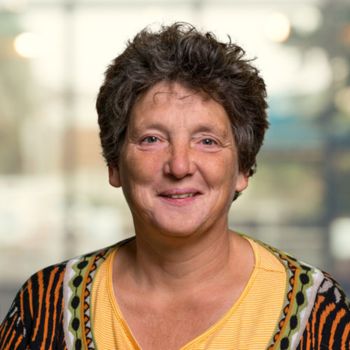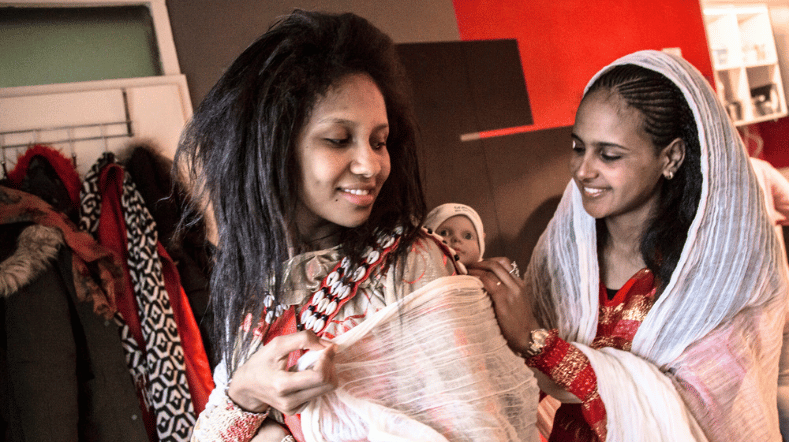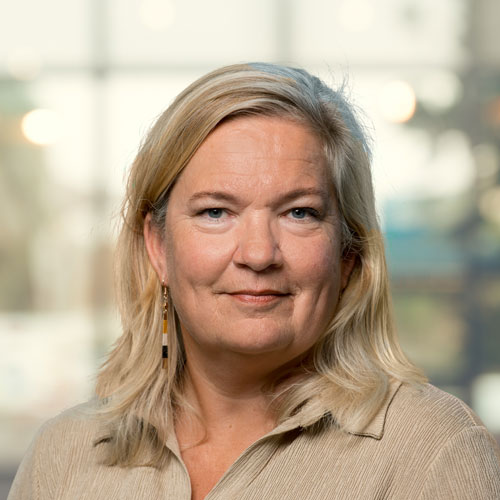
Centering: better care thanks to power of the group
Improving care with a group-based yet client-centred approach: Centering proves it can be done. This model of care centres on interactive group guidance, rather than one-to-one care. With good results for clients and care providers. So good that CenteringPregnancy and CenteringParenthood have been included in the Dutch National Institute for Public Health and the Environment (RIVM) database. Moreover, Centering is proving successful in chronic conditions such as type 2 diabetes.
What is CenteringCare?
CenteringCare is a care model based on three pillars: medical care, interactive learning, and peer support. Clients receive guidance in a fixed group instead of individual consultations. In CenteringPregnancy, for example, this is a group of pregnant women under the care of a midwife. And in CenteringParenthood, for example, it is a group of young parents with a baby within youth health care.
The format of the meetings
The meetings will cover basic medical care, standard check-ups, and vaccinations. But they are also encourage learning from each other's knowledge and experiences, such as certain complaints, sleep problems, nutrition, or the situation at home. The group has been set up to promote social contact. As a care provider, you support the same group over a longer period of time. For proper preparation and implementation of group care, support is available through the CenteringCare Foundation, such as training courses, supervision meetings, and implementation materials.
Why is Centering an important model of care?
Several studies have shown that Centering improves health outcomes, reduces pressure on the health care system, and increases satisfaction among clients and care providers.
Improved care outcomes and reduced pressure on the health care sector
- Studies show that group care leads to pregnant women and young parents feeling more supported and exhibiting healthier behaviour, such as breastfeeding, drinking less alcohol, and quitting smoking.
- Pregnant women receiving group care are less likely to develop high blood pressure. Fewer interventions are also needed, such as pain relief or augmentation of labour.
- Young parents are less likely to be admitted to the emergency unit with their child.
- This will ease pressure on health care and reduce costs.
Benefits for the client
- Clients are better prepared for what is to come, such as childbirth and parenthood.
- Hearing about others’ experiences normalises the challenges they face themselves.
- The trusted group provides a safety net of people nearby to fall back on. This is especially valuable for people who are new to a neighborhood or who have a small social network.
- Through mutual contacts and affirmation, the support they receive from the group, and the insights gained from group discussions, they develop greater self-confidence.
Benefits for the health care provider
- Much more is discussed in the group in a more accessible way than is possible in a one-to-one consultation.
- Difficult topics, such as domestic violence, come up for discussion by everyone because the group, rather than the individual, is addressed.
- The care provider learns more about the concerns clients have and the solutions they come up with themselves.
- Increased job satisfaction.
Emerging from practice
Sharon Schindler Rising, an American midwife, founded CenteringCare in 1995. Her one-to-one consultations kept overrunning because there was a lot to discuss. Moreover, she found herself having to give many different pregnant people the same information over and over again. She moved her consultation to her packed waiting room and discovered how valuable the dynamics and experiences within a group are. Rising published about group care, after which the Centering Healthcare Institute in the US further developed the model.

‘Centering creates a community where people support each other.’
In the Netherlands, it was also a (former) midwife who introduced CenteringCare: Marlies Rijnders, researcher at TNO Child Health. Since 2012, TNO has been working with the Centering Netherlands Foundation to implement and further develop the care model in practice.
Successful research projects
TNO is working with national and international partners to develop Centering even further and roll it out more widely. These include Leiden University Medical Centre (LUMC), Maastricht University, Group Care Global, CenteringCare Netherlands, and the Van Leer Foundation. Some successful projects:
A child's first 1,000 days, from conception to their second birthday, are crucial for their development throughout life. TNO’s Marlies Rijnders was involved in a Dutch study into the effects of group care during these first 1,000 days. Over 2,000 low-risk pregnant women in primary care participated. The main results were: a reduced risk of high blood pressure in pregnant women, improved mental health, healthier behaviour, and fewer complications during pregnancy and childbirth.
Every pregnant person receiving care according to the Centering model saves 76 euros in health care costs in the long run. Savings in social costs are calculated to be as high as 83 million euros. This is evident from research by LUMC and TNO (2013-2016). Reasons include the fact that women live healthier lives and breastfeed more often after birth. This economic evaluation eventually led to an Dutch Healthcare Authority (NZa) tariff for CenteringPregnancy.
Led by TNO, group care was implemented in 7 countries during a child's first 1,000 days between 2020 and 2024 – from Suriname to Kosovo and from South Africa to Belgium – with the aim of improving the well-being and health of young mothers and babies from vulnerable populations. The results are so good that all the countries in the project are continuing with it. Health care facilities and care providers worldwide can start implementing CenteringCare, thanks to the supporting materials available free of charge at www.groupcare1000.com.
Group care can help reduce health inequalities in the Netherlands. As part of the GC_1000 project, the care model was implemented in midwifery practices serving a high number of clients in vulnerable situations. This showed that CenteringPregnancy reached this group better than one-to-one care. In Kerkrade, TNO is now researching group care for mothers with mild intellectual disabilities.
A pilot has been running in asylum seekers' centres since 2023. The aim is to better match health care for this particular group with their perceptions, so they build a social network and reduce their social isolation. This also introduces them to the Dutch health care system.
CenteringZorg successfully expands
Now CenteringPregnancy and CenteringParenthood have been included in RIVM's 'recognised interventions' database. An important next step is further expansion into other branches of medicine. Group care is of great value when lifestyle plays an important role. And when frequent medical examinations are required, such as periodic check-ups for chronic illnesses. A Centering pilot for people with diabetes type 2 in Meppel led, among other things, to an improved lifestyle, greater control over disease progression, and better treatment adherence. A study on CenteringCare within oncology is ongoing in Belgium.
Different care model, different approach
The biggest challenge with CenteringZorg is that it is a systemic change: truly client-centred with an enabling role for care providers and a different organisational set-up. For example, health care practices need space for group meetings, as well as a corner for individual check-ups. As CenteringPregnancy is an accepted component of antenatal care, with a standard care fee, midwives need to know how to provide this form of care. TNO and CenteringZorg Nederland are therefore working with several midwifery schools to incorporate CenteringZorg.
Getting started with Centering
Would you like to get involved in a project or research on CenteringCare? Then contact TNO and take advantage of our expertise and innovative solutions. At TNO, we can support you with developing CenteringZorg further for your specific situation and putting forward your case to stakeholders.
We welcome anyone or any organisation (including those in the Netherlands), to contact us if they would like be part of this worldwide scaling effort. Contact [email protected].
Laat je verder inspireren
Group Care during the first 1000 days makes a difference around the world


Eight things to know about the D-score


D-score in practice: simplifying the complexity of a childs development


First 1000 days


